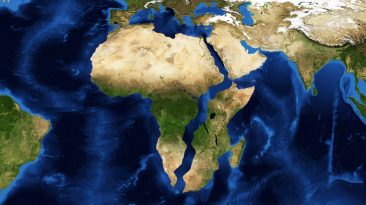Wait a minute, Neanderthals are extinct? Before you laugh, check yourself.
Neanderthal DNA is 99.7% identical to our own, and researchers claim that some humans might be carrying as much as 2% of the Neanderthal genome. Making things even weirder is that scientists recently recovered a nearly complete DNA sequence from a 50,000-year-old Neanderthal skeleton.
So in theory, Neanderthals could make a comeback. But how would they adapt? And how long would they survive?

Despite their physical differences, like being shorter, and having longer skulls, we might have more in common with Neanderthals than we’d like to admit. First of all, their brains were bigger, which doesn’t make them smarter than us, but they could communicate with one another.
They settled in family communities, and took care of the sick and the elderly. They also crafted sophisticated tools which would’ve been used for anything from hunting to possibly shipbuilding.
They even cooked their vegetables, and ate them. Which is more than you can say! So if Neanderthals are simply the beta version of what humans became, could they still live among us?
Neanderthals, in fact, did live among us! For about 5,000 years, Homo sapiens and Neanderthals co-existed in Europe, and likely interbred. This would explain why most Eurasians probably have at least 1% of the Neanderthal DNA in their genome, while anyone of African descent doesn’t have any Neanderthal DNA, since their ancestors did not migrate through Eurasia.

But with the Homo sapien population significantly outnumbering the Neanderthal population, it’s likely modern humans simply absorbed the Neanderthal species. Another theory is that we outcompeted them for resources during the last Ice Age, resulting in their extinction. But whichever theory is right, what if the concluding fact was wrong.
What if Neanderthals were not extinct. If Neanderthals somehow evolved as a separate, but very similar, species to humans, how would they fare? Despite their communication and craftsmanship abilities, the laws of natural selection prove that Homo sapiens are superior.
Which means the survival options for Neanderthals aren’t great. Barring the likelihood of early modern humans breeding them out of existence, Neanderthals would’ve probably become something like second–class citizens.
Would we enslave them? Keep them in zoos? Or force them to fight? It’s hard to say. Would the limits of their intelligence prevent them from fully integrating into modern society? Or would they learn and evolve, just like Homo sapiens?

Maybe they’d want nothing to do with us. Realizing how our differences outweigh our similarities, could we expect Neanderthals to establish their own communities and continue to exist independently of the developing world?
It’s hard to predict exactly how a species that went extinct about 40,000 years ago would behave today. But then again, maybe we just have to look around us. Neanderthals may be extinct, but we did evolve alongside them, and some of us inherited more than others. So think twice before you call someone a Neanderthal, it can be quite offensive!
Subscribe to What-If on Youtube or follow the show on Facebook Watch.
Sources
- “New Fossils From Jebel Irhoud, Morocco And The Pan-African Origin Of Homo Sapiens”. Hublin, Jean-Jacques, Abdelouahed Ben-Ncer, Shara E. Bailey, Sarah E. Freidline, Simon Neubauer, Matthew M. Skinner, and Inga Bergmann et al. 2017. Nature 546 (7657): 289-292. Springer Nature. doi:10.1038/nature22336.
- “World’S Oldest Homo Sapiens Fossils Found In Morocco”. 2017. Science | AAAS. Accessed April 17 2019.
- “What If Neanderthals Had Not Gone Extinct?”. Hadhazy, Adam. 2011. Live Science. Accessed April 17 2019.
- “What If Neanderthals Were Still Alive?“. Garden, Home, Science Myth, and What If. 2015. Howstuffworks. Accessed April 17 2019.
- “Neanderthal”. 2019. en.wikipedia.org. Accessed April 17 2019.
- “Ice Age”. 2019. HISTORY. Accessed April 17 2019.
- “Neanderthals: Facts About Our Extinct Human Relatives”. Szalay, Jessie, Science, Live. 2017. Live Science. Accessed April 17 2019.
- “World’S Oldest Homo Sapiens Fossils Found In Morocco”. Gibons, Ann, 2017. Science | AAAS. Accessed April 17 2019.



























